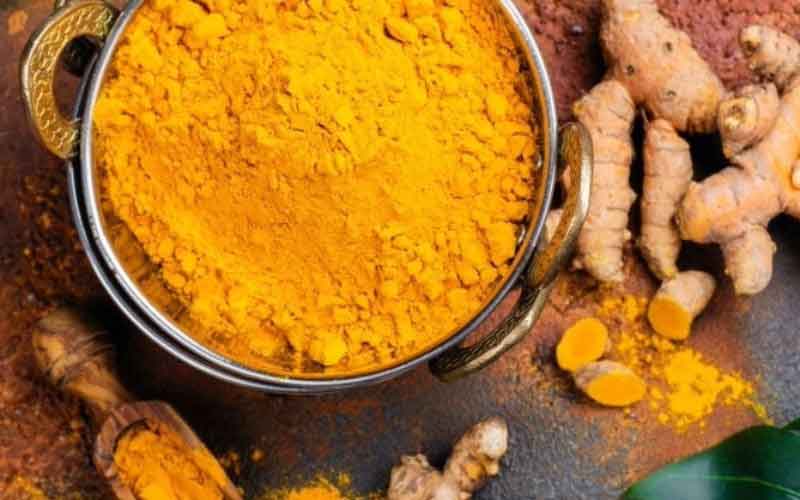Turmeric for Inflammation – Does it Work?
Turmeric (Curcuma longa), that vibrant golden spice we know from curries, has been used for centuries in traditional medicine as a natural healer. The real superstar in turmeric is a compound called curcumin, which packs a punch when it comes to fighting inflammation and acting as an antioxidant. It’s curcumin that’s behind most of turmeric’s well-known health benefits – whether you’re adding it to a dish (see recipes below) or taking it as a supplement.
How Curcumin Fights Inflammation
Curcumin works through several mechanisms to combat inflammation:
- Blocking NF-κB: Curcumin inhibits a protein called nuclear factor-kappa B (NF-κB), which plays a major role in triggering inflammation and controlling immune responses.
- Reducing Inflammatory Molecules: It also decreases the production of key pro-inflammatory molecules, like tumour necrosis factor-alpha (TNF-α) and interleukins (IL-6, IL-1β), which contribute to the body’s inflammatory process.
- Powerful Antioxidant: Additionally, curcumin acts as a potent antioxidant, helping to neutralise free radicals—unstable molecules that can lead to inflammation and cell damage.
Research on Turmeric for Inflammation
Recent studies have provided solid evidence for turmeric’s role in reducing inflammation in various conditions:
- Arthritis and Joint Inflammation: A study published in Trials in 2020 showed that curcumin was effective in reducing symptoms of knee osteoarthritis, performing similarly to non-steroidal anti-inflammatory drugs (NSAIDs), with fewer side effects. Another 2021 review in Journal of Clinical Medicine confirmed the efficacy of curcumin in reducing pain and improving function in patients with osteoarthritis.
- Chronic Inflammatory Diseases: Curcumin has been studied for its potential in managing chronic inflammatory diseases such as inflammatory bowel disease (IBD) and psoriasis. A 2019 study published in Pharmacological Research highlighted curcumin’s ability to reduce inflammation in ulcerative colitis by targeting inflammatory markers like TNF-α and IL-1β.
- Cardiovascular Health: Inflammation is a key factor in the development of heart disease. A 2021 review in Biomedicine & Pharmacotherapy suggested that curcumin could reduce the risk of heart disease by improving endothelial function and reducing oxidative stress. Another study in Nutrition Research in 2020 found that curcumin supplementation improved markers of inflammation and oxidative stress in patients with metabolic syndrome.
- Cancer Prevention: Chronic inflammation is linked to cancer development, and curcumin’s anti-inflammatory properties may help prevent tumour growth. A 2020 review in Cancer Letters examined curcumin’s role in cancer prevention and treatment, focusing on its ability to suppress pro-inflammatory pathways involved in tumour growth. However, more clinical trials are necessary to confirm its effectiveness in humans.
Bioavailability: A Key Limitation
One major limitation of curcumin is its poor bioavailability. The body absorbs curcumin inefficiently, which can limit its therapeutic effects. However, several strategies have been developed to enhance bioavailability:
- Combining with Piperine: Piperine, a compound found in black pepper, can enhance curcumin absorption by up to 2000%, as noted in a study from Phytotherapy Research.
- Curcumin Supplements: Liposomal curcumin, nano-formulated curcumin, and other enhanced supplements are designed to improve absorption and bioavailability.
Turmeric, especially curcumin, has shown great promise in reducing inflammation in various conditions, such as arthritis, cardiovascular diseases, and chronic inflammatory conditions. However, it should be viewed as a complementary therapy rather than a standalone treatment. Its effectiveness is often limited by poor bioavailability, but advancements in curcumin supplements have helped address this issue. While turmeric is not a “miracle cure,” it is certainly a valuable tool in managing inflammation.
Consuming Turmeric
There are several ways someone at home can take turmeric, depending on their preferences and health goals. Here are some common and simple methods:
1. Turmeric Tea (Golden Milk)
- Ingredients: 1 teaspoon of ground turmeric, 1 cup of milk (dairy or plant-based), a pinch of black pepper (enhances absorption), and optional honey or cinnamon for flavour.
- Instructions: Heat the milk, stir in the turmeric and black pepper, and let it simmer for a few minutes. Sweeten with honey or add cinnamon for extra flavour.
2. Turmeric Powder in Food
- Add to Cooking: Turmeric can be easily added to soups, stews, stir-fries, or rice. It adds a warm, slightly bitter flavour and a bright yellow colour to dishes.
- Smoothies: Add 1 teaspoon of turmeric powder to smoothies. Pair it with other anti-inflammatory ingredients like ginger, and remember to include a pinch of black pepper to boost absorption.
3. Turmeric Capsules
- Supplements: Turmeric supplements are available in capsule form, often combined with black pepper (piperine) or formulated for better absorption. These are convenient if you want a more precise dosage.
- Recommended Dosage: Typically, 500–2000 mg of turmeric extract (with 95% curcuminoids) per day is used in studies, but it’s best to consult a healthcare professional for personalised guidance.
4. Turmeric Paste
- Ingredients: 1/4 cup turmeric powder, 1/2 cup water, 1 teaspoon black pepper.
- Instructions: Heat the ingredients to form a paste. Store it in the fridge and add a small spoonful to milk or food daily for an anti-inflammatory boost.
5. Turmeric Shots
- Ingredients: 1 teaspoon fresh grated turmeric, juice from half a lemon, a pinch of black pepper, and a dash of honey.
- Instructions: Mix everything together and take as a shot. This can be a quick way to incorporate turmeric into your daily routine.
6. Turmeric with Honey (for Sore Throats)
- Ingredients: 1 teaspoon turmeric mixed with honey.
- Instructions: Mix and take by spoon to help soothe the throat, especially if dealing with inflammation or irritation.
Important Considerations
- Absorption: Curcumin, the active compound in turmeric, is not easily absorbed by the body. Always pair turmeric with black pepper (piperine), which can increase absorption by up to 2000%.
- Consult a Health Professional: If you’re on medications (e.g., blood thinners) or have health conditions, consult with a healthcare provider before regularly taking turmeric, especially in supplement form.
References
- Daily, J. W., Yang, M., & Park, S. (2016). Efficacy of turmeric extracts and curcumin for alleviating the symptoms of joint arthritis: a systematic review and meta-analysis of randomized clinical trials. Journal of Medicinal Food, 19(8), 717-729.
- Nakagawa, Y., Mukai, S., Yamada, S., Matsuoka, M., & Tarumi, E. (2020). Short-term effects of highly absorptive curcumin in knee osteoarthritis: a randomized, double-blind, placebo-controlled trial. Journal of Orthopaedic Science, 25(3), 614-621.
- Liu, Y., Zhang, W., Chen, F., et al. (2021). Curcumin alleviates rheumatoid arthritis-induced inflammation and synovial hyperplasia by targeting mTOR pathway in rats. Biomedicine & Pharmacotherapy, 137, 111381.
- Tomeh, M. A., Hadianamrei, R., & Zhao, X. (2019). A review of curcumin and its derivatives as anticancer agents. International Journal of Molecular Sciences, 20(5), 1033.
- Singh, Y., & Mehta, A. K. (2020). Enhancement of curcumin bioavailability by piperine: an update. Phytotherapy Research, 34(7), 1654-1664.

